跨文化交际案例分析(共7个)
- 格式:doc
- 大小:50.50 KB
- 文档页数:5
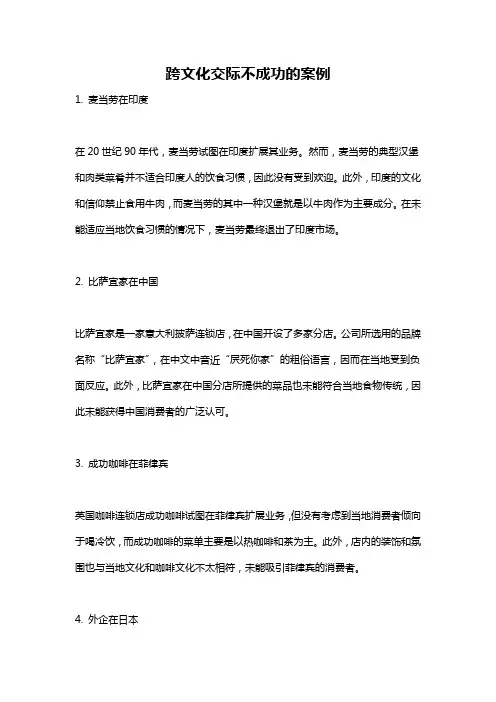
跨文化交际不成功的案例
1. 麦当劳在印度
在20世纪90年代,麦当劳试图在印度扩展其业务。
然而,麦当劳的典型汉堡和肉类菜肴并不适合印度人的饮食习惯,因此没有受到欢迎。
此外,印度的文化和信仰禁止食用牛肉,而麦当劳的其中一种汉堡就是以牛肉作为主要成分。
在未能适应当地饮食习惯的情况下,麦当劳最终退出了印度市场。
2. 比萨宜家在中国
比萨宜家是一家意大利披萨连锁店,在中国开设了多家分店。
公司所选用的品牌名称“比萨宜家”,在中文中音近“屄死你家”的粗俗语言,因而在当地受到负面反应。
此外,比萨宜家在中国分店所提供的菜品也未能符合当地食物传统,因此未能获得中国消费者的广泛认可。
3. 成功咖啡在菲律宾
英国咖啡连锁店成功咖啡试图在菲律宾扩展业务,但没有考虑到当地消费者倾向于喝冷饮,而成功咖啡的菜单主要是以热咖啡和茶为主。
此外,店内的装饰和氛围也与当地文化和咖啡文化不太相符,未能吸引菲律宾的消费者。
4. 外企在日本
外国企业在日本也面临着许多文化差异的挑战。
例如,日本公司经常强调集体决策和团队合作,而许多西方企业则更注重个人表现和工作独立性。
此外,在日本文化中,劳动力的稳定性和长期受雇是重要的价值观,而美国和欧洲的企业往往更注重短期成果和利润。
这些文化差异可能导致沟通和协作的问题,从而妨碍了外国企业在日本的发展。
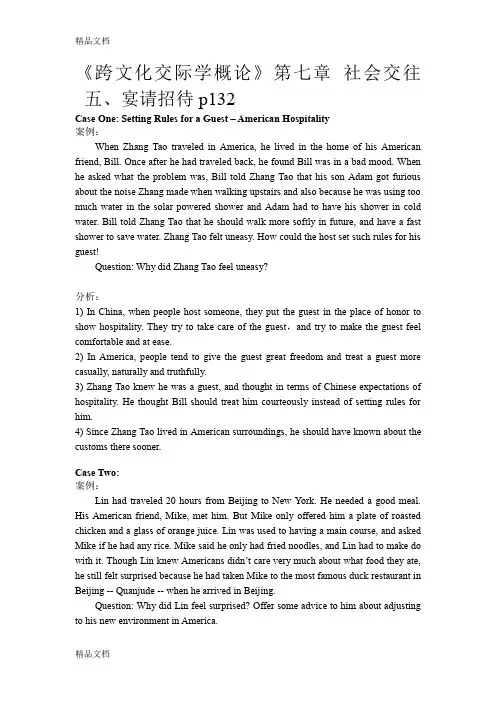
《跨文化交际学概论》第七章社会交往五、宴请招待p132Case One: Setting Rules for a Guest – American Hospitality案例:When Zhang Tao traveled in America, he lived in the home of his American friend, Bill. Once after he had traveled back, he found Bill was in a bad mood. When he asked what the problem was, Bill told Zhang Tao that his son Adam got furious about the noise Zhang made when walking upstairs and also because he was using too much water in the solar powered shower and Adam had to have his shower in cold water. Bill told Zhang Tao that he should walk more softly in future, and have a fast shower to save water. Zhang Tao felt uneasy. How could the host set such rules for his guest!Question: Why did Zhang Tao feel uneasy?分析:1) In China, when people host someone, they put the guest in the place of honor to show hospitality. They try to take care of the guest,and try to make the guest feel comfortable and at ease.2) In America, people tend to give the guest great freedom and treat a guest more casually, naturally and truthfully.3) Zhang Tao knew he was a guest, and thought in terms of Chinese expectations of hospitality. He thought Bill should treat him courteously instead of setting rules for him.4) Since Zhang Tao lived in American surroundings, he should have known about the customs there sooner.Case Two:案例:Lin had traveled 20 hours from Beijing to New York. He needed a good meal. His American friend, Mike, met him. But Mike only offered him a plate of roasted chicken and a glass of orange juice. Lin was used to having a main course, and asked Mike if he had any rice. Mike said he only had fried noodles, and Lin had to make do with it. Though Lin knew Americans didn’t care very much about what food they ate, he still felt surprised because he had taken Mike to the most famous duck restaurant in Beijing -- Quanjude -- when he arrived in Beijing.Question: Why did Lin feel surprised? Offer some advice to him about adjusting to his new environment in America.分析:1) 0n the topic of hospitality, the Chinese stress on warmth and demonstrating friendship. They take the guest to a famous or luxurious restaurant to have a very good (expensive) meal to show their hospitality. And the Chinese are used to having a big meal. The more dishes they put out,the greater the warmth and friendship they show.2) In western countries, people stress on freedom. They give the guest great freedom to choose their own foods. And westerners tend to have only one main course and some juice or dessert,which is viewed as casual in the eyes of the Chinese.3) Lin lived in American surroundings and should have adjusted himself quickly to the new world (lifestyle). He should have known the custom there first, and felt more at ease in Mike’s home.Case Three: Equality or Hospitality for Table Manners案例:Lin Hua has accompanied an American delegation to visit China. They have experienced the hospitality of the Chinese people. After returning to America, Linhua once visited them. They were so glad to meet again. Linhua offered to host the meal, but they refused. They ordered their own dish, and Linhua ordered her own. When footing the bill, they only paid their part,and no one wanted to pay for Linhua. Linhua found them so inhospitable, though she knew the Americans would usually pay for their own food.Question: Why did Linhua find them inhospitable?分析:1) In China, to show hospitality, people tend to host the meal. And if they cannot do this, they at least will struggle to pay for the guest.2) In America, people tend to pay for themselves to show equality and independence.3) Linhua knows this custom, but from a Chinese point of view, she still finds this hard to accept, and feels it a little inhospitable.Case Four:案例:I have an American friend. I have invited him several times, and at long last he invited me to his home one day. He told me to get there at 3 p m. I thought we could chat and have a meal together. I gave him a Chinese calendar, a woman’s scarf and a bottle of Chinese white wine. He only took out a dish of nuts, a plate of bread and a bottle of wine. After two hours’ chat, I found there was no hint of a meal and said good-bye to him. He only gave me a box of chocolate as a present for the New Year. After I got home, I found the box already been opened. I was very surprised, Question: What surprised me?分析:1) In China, a visit to home always includes a meal. And the guest always bringsa relatively expensive present to the host. And the present should be well wrapped or untouched.2) In the west, a visit to home only means a meeting, not necessarily including a meal. And the present is treated not as importantly as it is in China.3) I acted in a way that was based on Chinese customs, so I felt the American way was very interesting (unusual).Case Five: Way of Entertaining Guests in China ---- Drink more and more案例:Tom, an American, went to a Chinese home for the first time. He was offered some tea. Just when the first cup was about to finish, more tea was added. He drank the second cup. Then the cup was filled the third time. Then he drank it, then ⋯ until he was quite full. Tom was totally confused by the way of entertaining.Question: Why was Tom totally confused?分析:1) Traditional Chinese custom requires that during the course of entertaining, the host has to always pour more wine or tea to the guest’s glass or cup, and always adds more food to the guest’s plate or bowl without asking whether it’s wanted.2) Chinese guests know how to respond to this type of hospitality. They simply leave the wine, tea, or food in the container and stop having any more. But Tom, the American guest in the case didn’t know this.3) He followed the politeness rule of his culture: it’s not good manners to leave food in one’s own plate at a dinner table. Therefore, without any knowledge of the differences between the two cultures, an American guest would very likely suffer from either drinking or eating too much in such a situation.Case SixAs a foreign student at the University of Wisconsin in Madison, Keiko Ihara (Japanese) was on a strict budget. She had all her tuition and books paid for by scholarships and grants and until recently was comfortably housed in the dormitory. Wanting to live in the community rather than in the dormitory, she found a small apartment to share with a friend. Her college friends, knowing of her situation, offeredto round up some of the necessary items for apartment living. Keiko politely declined, saying she could manage. Wanting to help out her friends found some old but still usable household appliances and furniture. Mary had an old desk that was in her garage. Ed had some chairs from his uncle, and Joe and Marion had a few extra dishes. They cheerfully brought them over one day. Keiko seemed very embarrassed, but gracefully accepted them, sincerely and profusely thanked them.The following week they were each presented with a gift from Keiko. Mary got an ornate jewelry box, Ed a volume of woodcuts by a famous Japanese artist, and Joe and Marion a beautiful Japanese vase, all of which were of considerable worth and value, much more than the old things they had donated to her. They all protested that she could not afford to give such elaborate gifts; they really expected nothing as the household items were not really being used and they would rather have her use them. Keiko, however, insisted that they take the gifts. In the end, they accepted the gifts, although they all felt uncomfortable as they knew she was really sacrificing to give them.Questions:1. What do you think of Keiko insisting on giving valuable gifts to her college friends?2. Why did Keiko’s friends feel very uncomfortable when they received valuablegifts in return?分析:Keiko insists on giving valuable gifts to her college friends, because in countries like Japan, exchanging gifts is a strongly rooted social tradition. Should you receive a gift, and don’t have one to offer in return, you will probably create a crisis. If not as serious as a crisis, one who doesn’t offer a gift in return may be considered rude or impolite. Therefore, in Japan, gifts are a symbolic way to show appreciation, respect, gratitude and further relationship.Keiko obviously has taken those used items from Mary, Ed and Marion as gifts, for she probably doesn’t know that Americans frequently donate their used household items to church or to the community. Mary, Ed and Marion would never consider those used household items given to Keiko as gifts. No wonder they felt very uncomfortable when they received valuable gifts in return.Case SevenSelma, who is from the US, is in a student exchange program in Indonesia. One day, she was asked to attend a birthday party and she was delighted, for she was curious to know what an Indonesian birthday party was like. To her surprise, she was the only one that dressed in typically Western clothes. Although she had no strong reason to become uneasy, her uneasy feeling prevailed as the party was going on. To make herself feel better, she went to the food table and began to help herself. But, upon leaving the table, she tripped on the leg of a chair and spilled her drink on the floor. One of the girls stooped down to mop up the spill and everyone else laughed out loud. Selma, uncertain what to do next, quietly moved out of her way with her head lowered in shame.Questions:3. What functions does laughing serve in similar situations in China?4. What should we do to help ourselves or other people out of embarrassmentcaused by cultural differences in laughing?分析:Just like smile, laughing does not always serve the same function in different cultures. Interestingly, for us Chinese, laughing often has a special function on some tense social occasions. People may laugh to release the tension or embarrassment, to express their concern about you, their intention to put you at ease or to help you come out of the embarrassment. In this case, the people there were actually wishing to laugh with the American rather than laugh at her. Their laughing seemed to convey a number of messages: don‘t take it so seriously; laugh it off, it‘s nothing; such things can happen to any of us, etc. Unfortunately the American was unaware of this. She thought they were laughing at her, which made her feel more badly and angry, for in her culture laughing on such an occasion would be interpreted as an insulting response, humiliating and negative.。
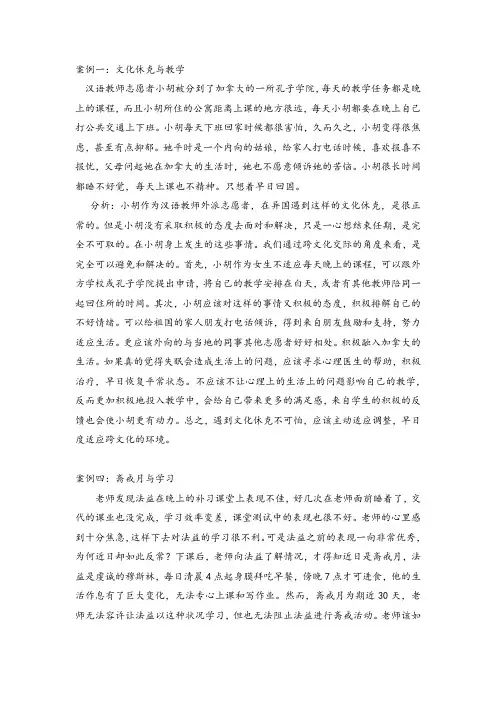
案例一:文化休克与教学汉语教师志愿者小胡被分到了加拿大的一所孔子学院,每天的教学任务都是晚上的课程,而且小胡所住的公寓距离上课的地方很远,每天小胡都要在晚上自己打公共交通上下班。
小胡每天下班回家时候都很害怕,久而久之,小胡变得很焦虑,甚至有点抑郁。
她平时是一个内向的姑娘,给家人打电话时候,喜欢报喜不报忧,父母问起她在加拿大的生活时,她也不愿意倾诉她的苦恼。
小胡很长时间都睡不好觉,每天上课也不精神。
只想着早日回国。
分析:小胡作为汉语教师外派志愿者,在异国遇到这样的文化休克,是很正常的。
但是小胡没有采取积极的态度去面对和解决,只是一心想结束任期,是完全不可取的。
在小胡身上发生的这些事情。
我们通过跨文化交际的角度来看,是完全可以避免和解决的。
首先,小胡作为女生不适应每天晚上的课程,可以跟外方学校或孔子学院提出申请,将自己的教学安排在白天,或者有其他教师陪同一起回住所的时间。
其次,小胡应该对这样的事情又积极的态度,积极排解自己的不好情绪。
可以给祖国的家人朋友打电话倾诉,得到来自朋友鼓励和支持,努力适应生活。
更应该外向的与当地的同事其他志愿者好好相处。
积极融入加拿大的生活。
如果真的觉得失眠会造成生活上的问题,应该寻求心理医生的帮助,积极治疗,早日恢复平常状态。
不应该不让心理上的生活上的问题影响自己的教学,反而更加积极地投入教学中,会给自己带来更多的满足感,来自学生的积极的反馈也会使小胡更有动力。
总之,遇到文化休克不可怕,应该主动适应调整,早日度适应跨文化的环境。
案例四:斋戒月与学习老师发现法益在晚上的补习课堂上表现不佳,好几次在老师面前睡着了,交代的课业也没完成,学习效率变差,课堂测试中的表现也很不好。
老师的心里感到十分焦急,这样下去对法益的学习很不利。
可是法益之前的表现一向非常优秀,为何近日却如此反常?下课后,老师向法益了解情况,才得知近日是斋戒月,法益是虔诚的穆斯林,每日清晨4点起身膜拜吃早餐,傍晚7点才可进食,他的生活作息有了巨大变化,无法专心上课和写作业。
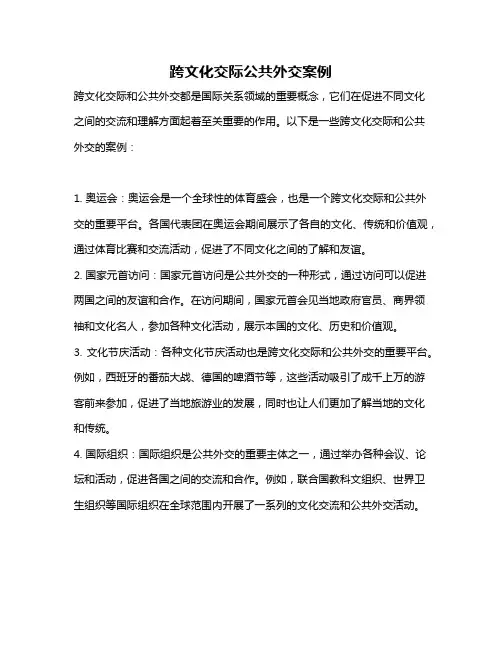
跨文化交际公共外交案例
跨文化交际和公共外交都是国际关系领域的重要概念,它们在促进不同文化之间的交流和理解方面起着至关重要的作用。
以下是一些跨文化交际和公共外交的案例:
1. 奥运会:奥运会是一个全球性的体育盛会,也是一个跨文化交际和公共外交的重要平台。
各国代表团在奥运会期间展示了各自的文化、传统和价值观,通过体育比赛和交流活动,促进了不同文化之间的了解和友谊。
2. 国家元首访问:国家元首访问是公共外交的一种形式,通过访问可以促进两国之间的友谊和合作。
在访问期间,国家元首会见当地政府官员、商界领袖和文化名人,参加各种文化活动,展示本国的文化、历史和价值观。
3. 文化节庆活动:各种文化节庆活动也是跨文化交际和公共外交的重要平台。
例如,西班牙的番茄大战、德国的啤酒节等,这些活动吸引了成千上万的游客前来参加,促进了当地旅游业的发展,同时也让人们更加了解当地的文化和传统。
4. 国际组织:国际组织是公共外交的重要主体之一,通过举办各种会议、论坛和活动,促进各国之间的交流和合作。
例如,联合国教科文组织、世界卫生组织等国际组织在全球范围内开展了一系列的文化交流和公共外交活动。
5. 媒体交流:媒体交流是跨文化交际和公共外交的重要手段之一。
通过媒体报道、电视节目和网络平台等渠道,人们可以更加了解不同国家的文化和价值观,同时也可以通过媒体交流促进不同文化之间的理解和友谊。
总之,跨文化交际和公共外交在促进国际交流和理解方面起着至关重要的作用。
通过各种形式的跨文化交际和公共外交活动,人们可以更加了解不同国家的文化和价值观,增进友谊和合作。
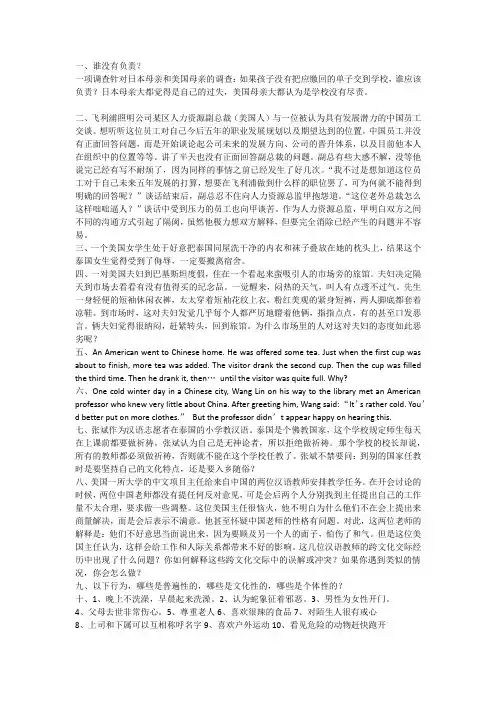
一、谁没有负责?一项调查针对日本母亲和美国母亲的调查:如果孩子没有把应缴回的单子交到学校,谁应该负责?日本母亲大都觉得是自己的过失,美国母亲大都认为是学校没有尽责。
二、飞利浦照明公司某区人力资源副总裁(美国人)与一位被认为具有发展潜力的中国员工交谈。
想听听这位员工对自己今后五年的职业发展规划以及期望达到的位置。
中国员工并没有正面回答问题,而是开始谈论起公司未来的发展方向、公司的晋升体系,以及目前他本人在组织中的位置等等。
讲了半天也没有正面回答副总裁的问题。
副总有些大惑不解,没等他说完已经有写不耐烦了,因为同样的事情之前已经发生了好几次。
“我不过是想知道这位员工对于自己未来五年发展的打算,想要在飞利浦做到什么样的职位罢了,可为何就不能得到明确的回答呢?”谈话结束后,副总忍不住向人力资源总监甲抱怨道。
“这位老外总裁怎么这样咄咄逼人?”谈话中受到压力的员工也向甲谈苦。
作为人力资源总监,甲明白双方之间不同的沟通方式引起了隔阂,虽然他极力想双方解释,但要完全消除已经产生的问题并不容易。
三、一个美国女学生处于好意把泰国同屋洗干净的内衣和袜子叠放在她的枕头上,结果这个泰国女生觉得受到了侮辱,一定要搬离宿舍。
四、一对美国夫妇到巴基斯坦度假,住在一个看起来蛮吸引人的市场旁的旅馆。
夫妇决定隔天到市场去看看有没有值得买的纪念品。
一觉醒来,闷热的天气,叫人有点透不过气。
先生一身轻便的短袖休闲衣裤,太太穿着短袖花纹上衣,粉红美观的紧身短裤,两人脚底都套着凉鞋。
到市场时,这对夫妇发觉几乎每个人都严厉地瞪着他俩,指指点点,有的甚至口发恶言。
俩夫妇觉得很纳闷,赶紧转头,回到旅馆。
为什么市场里的人对这对夫妇的态度如此恶劣呢?五、An American went to Chinese home. He was offered some tea. Just when the first cup was about to finish, more tea was added. The visitor drank the second cup. Then the cup was filled the third time. Then he drank it, then…until the visitor was quite full. Why?六、One cold winter day in a Chinese city, Wang Lin on his way to the library met an American professor who knew very little about China. After greeting him, Wang said: “It’s rather cold. You’d better put on more clothes.”But the professor didn’t appear happy on hearing this.七、张斌作为汉语志愿者在泰国的小学教汉语。

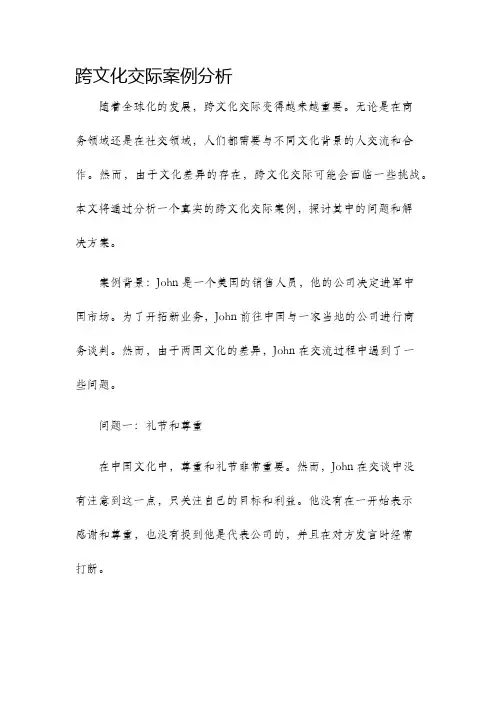
跨文化交际案例分析随着全球化的发展,跨文化交际变得越来越重要。
无论是在商务领域还是在社交领域,人们都需要与不同文化背景的人交流和合作。
然而,由于文化差异的存在,跨文化交际可能会面临一些挑战。
本文将通过分析一个真实的跨文化交际案例,探讨其中的问题和解决方案。
案例背景:John是一个美国的销售人员,他的公司决定进军中国市场。
为了开拓新业务,John前往中国与一家当地的公司进行商务谈判。
然而,由于两国文化的差异,John在交流过程中遇到了一些问题。
问题一:礼节和尊重在中国文化中,尊重和礼节非常重要。
然而,John在交谈中没有注意到这一点,只关注自己的目标和利益。
他没有在一开始表示感谢和尊重,也没有提到他是代表公司的,并且在对方发言时经常打断。
解决方案:在跨文化交际中,了解对方文化的礼节和习惯非常重要。
John应该在交谈开始时表示感谢和尊重,并明确表明自己的身份和目标。
他还应该尊重对方发言的权利,避免打断对方。
问题二:语言和沟通John并不懂中文,而对方的英文水平也有限。
在交流中,他们经常遇到理解和沟通的困难。
John使用了一些俚语和口语,对方很难理解。
另外,他们还遇到了一些语言使用上的误解和误译。
解决方案:语言是跨文化交际的重要因素之一。
在这种情况下,John可以使用简单的英语词汇和句子,避免使用俚语和口语。
另外,使用简洁明了的语言,避免使用复杂的词汇和长句子,有助于加强理解和沟通。
问题三:谈判风格和冲突处理中国和美国在谈判风格和冲突处理上存在一些差异。
John采取了直接和坦率的方式,直接表达自己的意见,并试图争取自己的利益。
然而,在中国文化中,人们通常更加注重保持面子和和谐,避免直接表达意见和产生冲突。
解决方案:了解对方的谈判风格和冲突处理方式对于跨文化交际至关重要。
John可以采取一种更加温和和委婉的方式,尊重对方的面子和和谐。
他可以提出一些建议,并鼓励对方发表意见,以达到双方都满意的结果。
总结:通过上述案例的分析,我们可以看到在跨文化交际中可能会出现的一些问题,以及解决这些问题的方法。
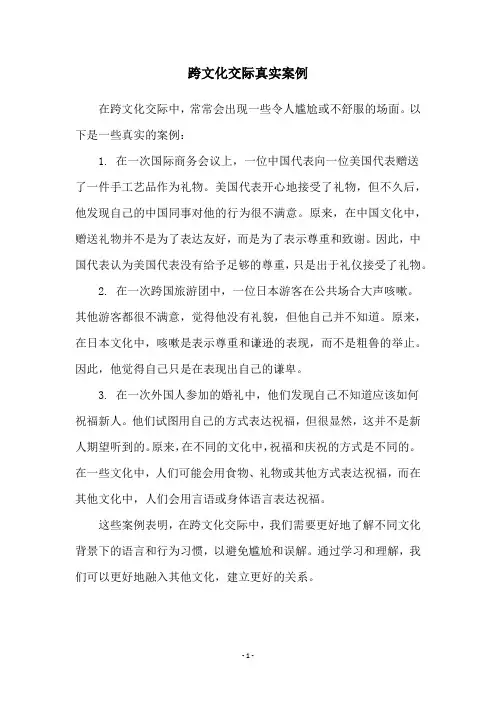
跨文化交际真实案例
在跨文化交际中,常常会出现一些令人尴尬或不舒服的场面。
以下是一些真实的案例:
1. 在一次国际商务会议上,一位中国代表向一位美国代表赠送
了一件手工艺品作为礼物。
美国代表开心地接受了礼物,但不久后,他发现自己的中国同事对他的行为很不满意。
原来,在中国文化中,赠送礼物并不是为了表达友好,而是为了表示尊重和致谢。
因此,中国代表认为美国代表没有给予足够的尊重,只是出于礼仪接受了礼物。
2. 在一次跨国旅游团中,一位日本游客在公共场合大声咳嗽。
其他游客都很不满意,觉得他没有礼貌,但他自己并不知道。
原来,在日本文化中,咳嗽是表示尊重和谦逊的表现,而不是粗鲁的举止。
因此,他觉得自己只是在表现出自己的谦卑。
3. 在一次外国人参加的婚礼中,他们发现自己不知道应该如何
祝福新人。
他们试图用自己的方式表达祝福,但很显然,这并不是新人期望听到的。
原来,在不同的文化中,祝福和庆祝的方式是不同的。
在一些文化中,人们可能会用食物、礼物或其他方式表达祝福,而在其他文化中,人们会用言语或身体语言表达祝福。
这些案例表明,在跨文化交际中,我们需要更好地了解不同文化背景下的语言和行为习惯,以避免尴尬和误解。
通过学习和理解,我们可以更好地融入其他文化,建立更好的关系。
- 1 -。
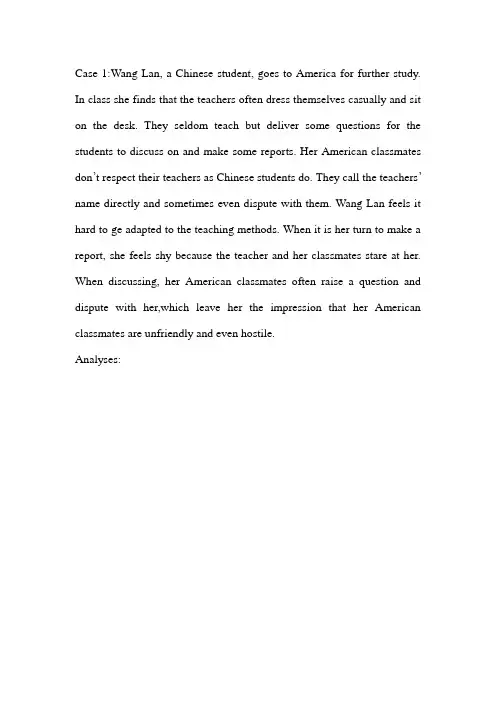
Case 1:Wang Lan, a Chinese student, goes to America for further study. In class she finds that the teachers often dress themselves casually and sit on the desk. They seldom teach but deliver some questions for the students to discuss on and make some reports. Her American classmates don’t respect their teachers as Chinese students do. They call the teachers’name directly and sometimes even dispute with them. Wang Lan feels it hard to ge adapted to the teaching methods. When it is her turn to make a report, she feels shy because the teacher and her classmates stare at her. When discussing, her American classmates often raise a question and dispute with her,which leave her the impression that her American classmates are unfriendly and even hostile.Analyses:Mom, can I borrow your stapler? I need it for my science assignment. (Steps back, slight frown)You know I wouldn’t mind lending to you but you never bring it back.(Steps forward,slight white in voice )Mom, I really need it for my project.I promise to bring it back this time.(Steps back, put her arms across her chest) That’s what we said last time you took it.(Begs)Please.I promise to bring it back as soon as I’m done.(stern voice) OK. But this is the last time. If you don’t bring it back, I won’t lend it to you again.Analyses:In July of this year, the American CNN announced that, the preserved egg is the most lousy food. That made the Chinese people very angry, because the preserved egg is good food for most of Chinese people. Then Chinese people made a survey and declared that cheese is the most lousy food. Chinese people can't accept that the preserved egg is regarded as the most lousy food, on the other hand, the cheese is the food which is favoured by most of American people. But Chinese people think that cheese is too irri tative. Both side cannot accept the food they selected. At the end of this c ase, the CNN reporters said sorry to Chinese people, but he said he would not eat the preserved egg.Analyses:An American vice president is talking with a Chinese employee who is regarded potential. He wants to know the next five years’ career path of the employee. However, the Chinese employee don’t answer his question directly. Rather, he begins to talk about the developing direction of the company, the promotion system and his position in the organization. The vice president is a little confused and becomes impatient before the employee finishes. The same case happens several times.After the talk, the vice president can’t help complaining to the director of HR,“I just wanted to know the employee’s plan in the next five years and the position he wants. Why couldn’t I get the answer?”Other employees who have suffered stress during the talk also complain to the director,“Why is the vice president so overbearing?”Analyses:As a visiting professor in an American university, Zhang Hua was invited to give a lecture to a group of American students. He talked about university students in China. During the question-and-answer period after the lecture, one female student asked a question that surprised Zhang Hua. “When you talked about female students, you referred to them as girls. Why?”“Because they are girls. That’s what they are called,” Zhang Hua tried to answer, but he knew he did not really understand th intent of the question.“I don’t quite understand your question, I’m afraid.”“In the States, we call ourselves“women”if we are old enough to go to the university. Calling us “girls”is insulting.”Analyses:Many years ago, a Chinese man showed a photo of his wife to some American visitors. Out of courtesy, they all said,“She is very beautiful.”Also out of courtesy, the man replied with what he would have done in Chinese under the circumstance,“Where! Where!”Quite taken aback, nobody said anything for a moment, until the most ingenious on among the visitors, taking another look at the photo, said,“Oh, everywhere.”Analyses:。

Case 1: She Has Three HandsIn the following scenario, a Chinese doctor, a patient and a physiotherapist interact.A female neurologist from Beijing was working on a research project in a Toronto hospital. She shared a small office with a young Canadian male from a large family, who loved peanut butter. He was so fond of peanut butter that he kept a jar in the office. One day he came into the office and exclaimed, “Who took my peanut butter?” But the Chinese woman immediately felt accused. After all, there were only two of them in the office.She was deeply distressed, but true to her learned cultural behavior of never showing anger in public, she said nothing. Later that day she was working in a room where the physiotherapist was treating a patient who suffered paralysis of his legs and arms from a motorcycle accident. The physiotherapist moved one of the patient’s legs in a way that caused him pain.“Ouch!” he cried.“Oh, I didn’t do that,” said the physiotherapist. “It was that doctor over there,” and he pointed to the Chinese woman.“How could she have done it since she’s on the other side of the room?” the patient pointed out.“Ah, she has three hands.” the physiotherapist replied.At these words the Chinese doctor became even more upset. She was so disturbed that she behaved in a way uncharacteristic of her culture. She waited until the patient had gone, and then said to the physiotherapist, “I’m very upset by what you said.” The physiotherapist was taken aback. “What had I said?”“You said I had three hands,” the Chinese doctor finally choked. “You think I took the peanut butter.”Answer the following questions:1.How do you understand the phrase “to have three hands”? (3分)2.What caused their communication conflicts?(7分)Case 1:This case can reflect the different communication styles between Chinese and Canadians. In western cultures, communication is the means of transmitting ideas. Western people usually communicate directly with each other. That is why the Canadian in this case says what is in his mind directly in front of the Chinese woman without hiding anything. While Chinese culture stresses harmony and emphasizes the relationships between the communicators. Chinese people view communication as a process where all parties are searching to develop and maintain a social relationship. So the Chinese woman in this case tries not to argue with the Canadian face to face to keep the“harmonious relationship”between them.Case 2: Left in the ColdKatherine came to Beijing in 1998 and found a job as an English teacher in a foreign language institute. Soon after her classes began she found that her students showed no interest in her teaching style. Quite a few of them avoided attending her class. She was feeling quite upset and discouraged so she decided to ask the Director, Prof. Wang for help. Prof. Wang reviewed his timetable and suggested they meet at ten o’clock on Thursday morning. When Thursday came, Katherine arrived at Prof. Wang’s office at the exactly ten o’clock finding him talking with another teacher in Chinese. Seeing that she had come, Prof. Wang smiled and gestured her to sit down. Katherine sat down and the professor excused himself and continued to talk with the other teacher. After five minutes, he finished his conversation, and apologized to Katherine, and began to focus his attention on her situation. Prof. Wang showed great concern and asked her what the problem was. Just as she was discussing her problem, another Chinese teacher interrupted, with a form that required the Director’s signature. The Director smiled, apologized to Katherine again, and turned to talk with the Chinese teacher in Chinese. Katherine became impatient, and wondered why their discussion should be interrupted since she had made an appointment. Also, she was upset and frustrated that they continued to speak Chinese in front of her. Although their talk continued, she was apparently unhappy about what had happened.Answer the following questions:1.How would you explain the Director’s behavior toward Kathrine?(5分)2.How would you make the Director understand why Katherine felt frustrated and angry? (5分)Case 2:CommentThis is a typical cultural clash between Chinese and Westerners. There is a great difference in the concept of appointment and its behavior pattern in different cultures. To Americans, an appointment is a confirmation to meet at a precise time. If an appointment is scheduled, both parties should respect the appointment time. For example, if a professor makes an appointment with a student at a certain time, it should not be interrupted by other things or people. In addition, Westerners are good timekeepers; they adhere strictly to schedules. However, Chinese view appointments in a more flexible manner. They are more casual about commitments. This difference in attitudes toward appointment was the root of Katherine’s unhappiness. Since the Director made an ten a’clock appointment, he should have tried to avoid any interruption. However, when Katherine arrived on time, the Director was still talking with another teacher. When their meeting finally began, it was interrupted again. There is no wonder Katherine became frustrated and angry.Case 3: Personal SpaceMark had recently moved from Denmark to Sydney to work as a salesperson for a large Australian company. After three weeks, he was invited to join a local club. During the first few weeks at the club, Mark would either stand in the corner talking with someone or sit on a sofa listening to other people talk and chat. As time went by, he came to know most of the club members and seemed to enjoy talking with them. One day, at an evening party one of the female members approached him. Mark immediately showed his interest by talking about the atmosphere of the party. At first, the conversation between them seemed to go quite smoothly, but as it progressed the lady seemed to step further and further away from Mark as he had been gradually moving closer to her. The lady obviously seemed uncomfortable. As Mark was about to ask her questions regarding Australian social customs, another man standing nearby directed a glance toward the lady. She excused herself and went to talk with that man, leaving Mark standing alone and wondering why their conversation had come to such a sudden stop.Answer the following question1. Why did that woman suddenly stop talking with Mark and turned to another man? (10分)Case 3:This is a typical case of misunderstanding caused by different perceptions abut body distance.There is a lot of evidence to show that body distance varies with different people, different circumstances, and different cultures. In Denmark, at a formal event, the intimate space is usually between 20 to 30 centimeters; while in Australia such an occasion requires a body distance of 40 to 50 centimeters. Therefore when a Dane talks with an Australian, the problem arises: the Dane is accustomed to a close distance while the Australian is comfortable with a great distance.In this case, Mark, by trying to establish his normal intimate space, infringed on the Australian lady’s space. Because of this, she felt somewhat threatened and lost her sense of comfort. At that moment, the nearby man offered her the opportunity to excuse herself from Mark. If Mark had had some knowledge about the expected personal space for Australians, the encounter might have been totally different.Case 4Li Ming, a male Chinese graduate student, studied in the United States. He shared a room with his American classmate Tony in a residence hall. At the very beginning, Li Ming found it easy and enjoyable to get along with Tony, for he was an open-minded person and sometimes he could give Li Ming quite a lot of helpful advice. But later,Li Ming felt it really hard to do the real effective communication. For example:One day Tony went into the bathroom and completely shaved his head. Li Ming easily discovered this fact when he himself visited the bathroom and saw the hair everywhere. He returned to his room and said to Tony, “You’ve shaved your head.” Tony replied, “Yeah, I did.”Li Ming waited a while, then said, I discovered you’d shaved your head when I went into the bathroom and saw the hair. “Yeah.” Tony confirmed. Li Ming was at a loss. He believed he had communicated in the strongest possible language his wish that the American would clean up the mess he’d made in the bathroom. But Li Ming was very much disappointed at his roommate Tony!Later he discussed the surprising episode with some Chinese friends who told him, “Listen, with Americans you actually have to say: Clean up the bathroom!” Li Ming believed his message had been very clear. However, he was relying on the context of the communication for the message to be understood: hair was all over the bathroom, and his roommate now was bare-headed.Questions:1. Why do you think the American student Tony failed to understand what his Chinese roommate Li Ming had wanted to say?2. Suppose the main characters in the story are two Chinese studentsor two American students, in what way will they deal with the matter?Case 7 (P30)Case analysis: Cultural differences decide the two students are going to communicate in different ways. 案例分析:文化差异决定这两个学生要沟通的方式不同。
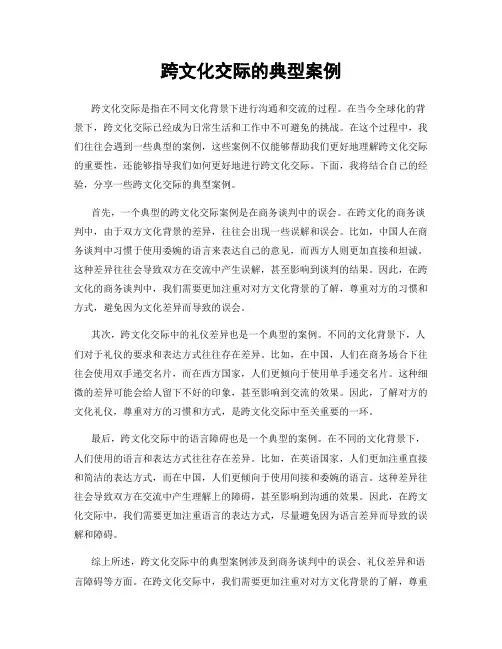
跨文化交际的典型案例跨文化交际是指在不同文化背景下进行沟通和交流的过程。
在当今全球化的背景下,跨文化交际已经成为日常生活和工作中不可避免的挑战。
在这个过程中,我们往往会遇到一些典型的案例,这些案例不仅能够帮助我们更好地理解跨文化交际的重要性,还能够指导我们如何更好地进行跨文化交际。
下面,我将结合自己的经验,分享一些跨文化交际的典型案例。
首先,一个典型的跨文化交际案例是在商务谈判中的误会。
在跨文化的商务谈判中,由于双方文化背景的差异,往往会出现一些误解和误会。
比如,中国人在商务谈判中习惯于使用委婉的语言来表达自己的意见,而西方人则更加直接和坦诚。
这种差异往往会导致双方在交流中产生误解,甚至影响到谈判的结果。
因此,在跨文化的商务谈判中,我们需要更加注重对对方文化背景的了解,尊重对方的习惯和方式,避免因为文化差异而导致的误会。
其次,跨文化交际中的礼仪差异也是一个典型的案例。
不同的文化背景下,人们对于礼仪的要求和表达方式往往存在差异。
比如,在中国,人们在商务场合下往往会使用双手递交名片,而在西方国家,人们更倾向于使用单手递交名片。
这种细微的差异可能会给人留下不好的印象,甚至影响到交流的效果。
因此,了解对方的文化礼仪,尊重对方的习惯和方式,是跨文化交际中至关重要的一环。
最后,跨文化交际中的语言障碍也是一个典型的案例。
在不同的文化背景下,人们使用的语言和表达方式往往存在差异。
比如,在英语国家,人们更加注重直接和简洁的表达方式,而在中国,人们更倾向于使用间接和委婉的语言。
这种差异往往会导致双方在交流中产生理解上的障碍,甚至影响到沟通的效果。
因此,在跨文化交际中,我们需要更加注重语言的表达方式,尽量避免因为语言差异而导致的误解和障碍。
综上所述,跨文化交际中的典型案例涉及到商务谈判中的误会、礼仪差异和语言障碍等方面。
在跨文化交际中,我们需要更加注重对对方文化背景的了解,尊重对方的习惯和方式,避免因为文化差异而导致的误会。
材料:中国学生王兰去美国留学,她到美国发现,老师的穿着比较随便,上课的时候经常坐在桌子上。
老师上课时很少自己讲授而是提出问题让同学们讨论,作报告。
她的美国同学也不像中国学生对老师那样尊重,不但直呼其名甚至会和老师争论的面红耳赤。
王兰对老师的教学方法非常不适应,轮到她作报告时她经常觉得非常不好意思,因为老师和同学总是盯着她的眼睛看她。
在讨论时她的美国同学经常要提出问题,甚至和她争论。
这让她觉得她的美国同学对她有敌意,很不友好。
答:总体来说,该材料所反映的是由于中西文化差异而产生的文化冲突,并出现跨文化交际的障碍,造成跨文化交际的失败。
一、问题1:认识上的误区。
不同文化背景的人在交际过程中最容易犯的一个毛病是误以为对方与自己没什么两样。
中国学生王兰去美国留学,她到美国发现,老师的穿着比较随便,上课的时候经常坐在桌子上。
老师上课很少自己讲授而是提出问题让学生们讨论、作报告。
分析1:王兰认为,在中国教师表现出为人师表的形象,庄重,严肃,言谈举止中常带有教师的尊严,从着装上也比较讲究传统,正派,师生关系相对比较融洽,但是界线比较清楚,课堂纪律严明,要求学生认真听讲,认真记,老师提问,学生回答,学生不会主动回答问题或者自由发表自己对某个问题的看法。
这是由于王兰把中国的文化规范误认为是他人也接受的文化规范。
正是因为这样,加上缺乏跨文化意识和跨文化交际的经验,所以出现认识上的误区这一障碍。
解决1:认为别人与自己大致相同的想法十分自然,但是对于跨文化交际来说是有害的。
在进行跨文化交际的过程中,必须不断提醒自己人们有着不同的文化背景,迥异的习俗。
必须学会观察异国文化,善于与自己的文化对比,才能逐步提高自己的跨文化意识。
二、问题2:民族中心主义。
她的美国同学也不像中国学生对老师那样尊重,不但直呼其名甚至会和老师争论的面红耳赤。
分析2:所谓民族中心主义就是按照本民族文化的观念和标准去理解和衡量其他民族文化中的一切。
王兰觉得中国“尊师重道”的行为规范才是正确师生关系的表现。
(一)典型案例:飞利浦照明公司某区人力资源的一名美国籍副总裁与一名被以为具有发展潜力的中国员工交谈。
他很想听听这位员工对自己此后五年的职业发展计划和期望达到的位置。
中国员工并无正面回答问题,而是开始谈论起公司未来的发展方向、公司的晋升体系,和目前他本人在组织中的位置等等,说了半天也没有正面回答副总裁的问题。
副总裁有些疑惑不解,没等他说完已经不耐烦了。
一样的事情之前已经发生了好几回。
谈话结束后,副总裁忍不住想人力资源总监抱怨道:“我不过是想知道这位员工对于自己未来五年发展的打算,想要在飞利浦做到什么样的职位算了,可为何就不能取得明确的回答呢?”“这位老外总裁怎么这样咄咄逼人?”谈话中受到压力的员工也向人力资源总监诉苦。
(二)案例中的文化不同对沟通产生的影响分析在该案例中,副总裁是美国籍人,而那位员工则是中国籍。
显然,对于诞生于两个不同的国度的人,中美之间思维方式、生活习惯、文化背景、教育程度、文化不同样多个方面都存在着显著的不同。
正是由于这些文化不同的存在,才使得两边在沟通交流的进程中产生一系列障碍。
案例中“中国员工并无正面回答问题”,原因可能是多种多样的。
(1)语言障碍、没有理解透彻美国副总裁所说话语的原意。
中文和英文之间存在很大的不同,在咱们学习英文的进程中咱们可以体会到,对于一个中国人,要完全部会英文背后的文化是很困难的一件事。
例如,“pull one's leg”本意是“开玩笑”,但咱们很容易就理解成“拉后腿”的意思了。
(2)思维方式明显不相同。
假设这位中国员工从正面直接回答了副总的问题。
比如,中国员工回答:“……想在五年之内作到营销部领导的职位。
”很显然,依照中国人的传统心理,这样的回答违背了中国人一贯谦虚、委婉的心理习惯。
太直接反而暴露出自己很有野心,高傲自大的缺点。
谦虚也可以给自己留有后路,万一做不到那个理想的位子,也不至于丢体面,被人嘲笑。
恰恰相反,美国人一贯简单明了,很直接,这也是他们一贯的思维方式。
跨文化交际真实案例跨文化交际真实案例:我与新西兰室友的交流在我留学新西兰期间,我与新西兰室友之间的跨文化交际经历给我留下了深刻的印象。
下面我将分享其中的十个案例。
1. 宗教差异:我第一次与室友见面时,发现他们祈祷前会合掌,而我习惯合十。
为了避免尴尬,我主动向他们解释我的习惯,并询问他们的宗教信仰,以更好地了解彼此。
2. 饮食文化:我喜欢吃辣的食物,但新西兰人的饮食相对较淡。
为了满足我的口味,我经常自己煮辣味菜肴,但我也尊重他们的饮食习惯,不会强迫他们吃辣。
3. 社交礼仪:在新西兰,人们习惯于亲吻对方的面颊,以示问候和道别。
对于我来说,这种亲昵的举止有些不习惯。
尽管如此,我还是尊重他们的习惯,并逐渐适应了这种方式。
4. 学习风格:在学习上,我习惯于独立思考和解决问题。
而我的室友则更喜欢小组讨论和合作学习。
为了更好地适应新的学习环境,我主动与他们合作,分享我的想法和经验。
5. 社交活动:在新西兰,人们喜欢户外活动,如野餐、露营等。
我之前并不常参加这些活动,但为了更好地融入当地文化,我主动参加了一些户外活动,并与室友一起度过了愉快的时光。
6. 语言障碍:刚来新西兰时,我的英语水平有限,与室友交流存在一定困难。
为了克服语言障碍,我努力学习英语,并与室友多进行口语练习。
他们也很耐心地帮助我纠正语法错误和提升口语表达能力。
7. 文化节日:在新西兰,有许多与当地文化和传统有关的节日。
我利用这些机会了解当地的文化,并主动参加庆祝活动,与室友一起分享和学习。
8. 生活习惯:我在中国习惯于早睡早起,而我的室友则喜欢熬夜。
为了避免互相打扰,我们商量后制定了一些规则,例如在晚上安静不吵闹,相互尊重对方的作息时间。
9. 交通规则:在新西兰,驾驶习惯与中国不同。
我刚来时并不熟悉当地的交通规则,但我室友很耐心地向我解释,并带我一起学习和适应当地的交通环境。
10. 价值观差异:我来自一个重视家庭观念的文化,而我的室友则更注重个人独立和自由。
案例1:A shoe store in Rome had a sign in front of the shop to attract English—— speaking customers: Shoes for streetwalker. Come in and have a fit. When some English—speaking tourists saw this sign, they laughed.在案例1中,W alker在英语中是步行者、常散步的人等含义, 但短语a street walker则有妓女、娼妓之意, 而这一罗马店主想当然地把街上行人直接翻译为“street walker”。
另外, to have a fit并不意味着to have a try; 虽然fit有“使(服装等) 合身,(服装等) 合..的身”之意, 但to have a fit则表示“大发脾气, 大为烦恼”的意思。
所以, 可以想象当操英语的游客途经此商店, 看到该店的广告: Shoes for streetwalker. Come in and have a fit. 将是怎样的情形。
同理,美国通用汽车公司在墨西哥卖汽车起了一个名字叫“NA VO”,.. “NA VO”在西班牙语中的意思是“it doesn’t go”(不能开)。
给车起了一个不好的名字。
墨西哥人当然不会买了,结果市场惨败。
此外,上海产“白翎”钢笔,英译为“white feather”。
在英语国家无人问津,其原因是在于英语中有一句成语“to show the white feather”.. ,意思是临阵脱逃,白色羽毛象征的胆小鬼。
那么这种钢笔的销售不好,自然也在情理之中。
词汇是语言主要的基本单位, 是语言体系中结构和意义的统一体。
词汇意义有“概念意义”和“内涵意义”之分, 前者比较固定, 通常是字典给定的意义, 而后者则指扩展意义或联想意义。
留学生跨文化交际案例分析跨文化交际是指在不同文化背景下进行交流和交际的过程。
留学生由于身处异国他乡,需要不断与不同文化背景的人进行交流和交际,因此面临着跨文化交际的挑战。
本文将通过一个留学生跨文化交际案例来分析这一挑战,并探讨如何有效进行跨文化交际。
案例:小明是一名中国留学生,在美国求学。
他在学校里结识了几位美国朋友,并打算邀请他们来中国做客。
小明精心准备了一顿中餐,并计划在晚餐时邀请他的美国朋友们来家里作客。
在晚餐当天,小明热情地迎接了他的美国朋友,并自豪地介绍了中餐的特点和中国餐桌礼仪。
然而,小明发现他的美国朋友们对中餐并不是那么感兴趣。
除了一个人尝试了几口,其他人只是用礼貌地品尝了一小部分,并表达了对饭量太大的担忧。
他们之间的对话变得有些尴尬,大家不知道该如何继续交流。
为了有效进行跨文化交际,小明可以采取以下措施:1.了解对方文化:在邀请他的美国朋友来中国之前,小明可以了解一些他们对中国文化和饮食的了解程度。
这有助于小明更好地与他们进行交流,并根据他们的兴趣选择适合的活动和食物。
2.尊重对方文化:小明可以通过尊重对方的饮食习惯和文化背景来展示自己对他们的重视。
在此案例中,小明可以为他的美国朋友准备一些他们熟悉和喜欢的食物,以满足他们的口味。
3.共享文化:除了介绍中餐,小明还可以主动询问他的美国朋友们对于西餐的了解和喜好,并主动分享一些关于中国文化和饮食的有趣故事和知识。
这有助于增进彼此之间的了解和交流。
4.引导对话:当对话变得尴尬时,小明可以主动引导话题转向其他感兴趣的主题,如音乐、电影、运动等。
这可以帮助缓解尴尬氛围,促进交流和互动。
通过以上措施,小明可以更好地进行跨文化交际,与他的美国朋友建立起良好的关系。
在跨文化交际中,理解和尊重他人的文化背景至关重要,同时也要积极展示自己的文化,以促进双方之间的理解和交流。
大学英语跨文化交际案例分析Case 2 (P8)White Dress女王的白色长裙:Case analysis: The Indian women might think the wedding ceremony is a funeral if they see the western bride in white gown. The case reflects the similes and metaphors in the text。
案例分析:印度女人可能觉得婚礼是一个葬礼,如果他们看到西方的新娘的白色礼服。
这个案例反映了明喻和隐喻在文本。
Culture is like an iceberg: we can identify the color of the dress worn by women in different cultures, but we do not know the values underneath。
Culture is like the water a fish swims in: people wear dress of different colors for different context but they usually take it for granted and never ask why。
文化是像冰山:我们可以辨认颜色衣服的妇女所穿不同的文化,但我们不知道下面的值。
文化是像水鱼游在:人们穿不同颜色的衣服为不同的上下文,但他们通常是理所当然的,从不问为什么。
Case 4 (P18)Coconut-skating椰子—溜冰:Case analysis: The case reflects the characteristics of culture. We can tell from the case that culture is pervasive and it’s learned.案例分析:这个事件反映了文化的特点.我们可以告诉从案件,文化是普遍的,这是学习.People may invent different ways for things even as simple as the issue of floor moping. The Philippine woman must have learned this way of mopping from her own culture。
《跨文化交际学概论》第七章社会交往五、宴请招待p132Case One: Setting Rules for a Guest – American Hospitality案例:When Zhang Tao traveled in America, he lived in the home of his American friend, Bill. Once after he had traveled back, he found Bill was in a bad mood. When he asked what the problem was, Bill told Zhang Tao that his son Adam got furious about the noise Zhang made when walking upstairs and also because he was using too much water in the solar powered shower and Adam had to have his shower in cold water. Bill told Zhang Tao that he should walk more softly in future, and have a fast shower to save water. Zhang Tao felt uneasy. How could the host set such rules for his guest!Question: Why did Zhang Tao feel uneasy?分析:1) In China, when people host someone, they put the guest in the place of honor to show hospitality. They try to take care of the guest,and try to make the guest feel comfortable and at ease.2) In America, people tend to give the guest great freedom and treat a guest more casually, naturally and truthfully.3) Zhang Tao knew he was a guest, and thought in terms of Chinese expectations of hospitality. He thought Bill should treat him courteously instead of setting rules for him.4) Since Zhang Tao lived in American surroundings, he should have known about the customs there sooner.Case Two:案例:Lin had traveled 20 hours from Beijing to New York. He needed a good meal. His American friend, Mike, met him. But Mike only offered him a plate of roasted chicken and a glass of orange juice. Lin was used to having a main course, and asked Mike if he had any rice. Mike said he only had fried noodles, and Lin had to make do with it. Though Lin knew Americans didn’t care very much about what food they ate, he still felt surprised because he had taken Mike to the most famous duck restaurant in Beijing -- Quanjude -- when he arrived in Beijing.Question: Why did Lin feel surprised? Offer some advice to him about adjusting to his new environment in America.分析:1) 0n the topic of hospitality, the Chinese stress on warmth and demonstrating friendship. They take the guest to a famous or luxurious restaurant to have a very good (expensive) meal to show their hospitality. And the Chinese are used to having a big meal. The more dishes they put out,the greater the warmth and friendship they show.2) In western countries, people stress on freedom. They give the guest great freedom to choose their own foods. And westerners tend to have only one main course and some juice or dessert,which is viewed as casual in the eyes of the Chinese.3) Lin lived in American surroundings and should have adjusted himself quickly to the new world (lifestyle). He should have known the custom there first, and felt more at ease in Mike’s h ome.Case Three: Equality or Hospitality for Table Manners案例:Lin Hua has accompanied an American delegation to visit China. They have experienced the hospitality of the Chinese people. After returning to America, Linhua once visited them. They were so glad to meet again. Linhua offered to host the meal, but they refused. They ordered their own dish, and Linhua ordered her own. When footing the bill, they only paid their part,and no one wanted to pay for Linhua. Linhua found them so inhospitable, though she knew the Americans would usually pay for their own food.Question: Why did Linhua find them inhospitable?分析:1) In China, to show hospitality, people tend to host the meal. And if they cannot do this, they at least will struggle to pay for the guest.2) In America, people tend to pay for themselves to show equality and independence.3) Linhua knows this custom, but from a Chinese point of view, she still finds this hard to accept, and feels it a little inhospitable.Case Four:案例:I have an American friend. I have invited him several times, and at long last he invited me to his home one day. He told me to get there at 3 p m. I thought we could chat and have a meal together. I gave him a Chinese calendar, a woman’s scarf and a bottle of Chinese white wine. He only took out a dish of nuts, a plate of bread and a bottle of wine. After two hours’ chat, I found there was no hint of a meal and said good-bye to him. He only gave me a box of chocolate as a present for the New Year. After I got home, I found the box already been opened. I was very surprised, Question: What surprised me?分析:1) In China, a visit to home always includes a meal. And the guest always bringsa relatively expensive present to the host. And the present should be well wrapped or untouched.2) In the west, a visit to home only means a meeting, not necessarily including a meal. And the present is treated not as importantly as it is in China.3) I acted in a way that was based on Chinese customs, so I felt the American way was very interesting (unusual).Case Five: Way of Entertaining Guests in China ---- Drink more and more案例:Tom, an American, went to a Chinese home for the first time. He was offered some tea. Just when the first cup was about to finish, more tea was added. He drank the second cup. Then the cup was filled the third time. Then he drank it, then ⋯ until he was quite full. Tom was totally confused by the way of entertaining.Question: Why was Tom totally confused?分析:1) Traditional Chinese custom requires that during the course of entertaining, the host has to always pour more wine or tea to the guest’s glass or cup, and always adds more food to the guest’s plate or bowl without asking whether it’s wanted.2) Chinese guests know how to respond to this type of hospitality. They simply leave the wine, tea, or food in the container and stop having any more. But Tom, the American guest in the case didn’t know this.3) He followed the politeness rule of his culture: it’s not good manners to leave food in one’s own plate at a dinner table. Therefore, without any knowledge of the differences between the two cultures, an American guest would very likely suffer from either drinking or eating too much in such a situation.Case SixAs a foreign student at the University of Wisconsin in Madison, Keiko Ihara (Japanese) was on a strict budget. She had all her tuition and books paid for by scholarships and grants and until recently was comfortably housed in the dormitory. Wanting to live in the community rather than in the dormitory, she found a small apartment to share with a friend. Her college friends, knowing of her situation, offered to round up some of the necessary items for apartment living. Keiko politely declined, saying she could manage. Wanting to help out her friends found some old but still usable household appliances and furniture. Mary had an old desk that was in hergarage. Ed had some chairs from his uncle, and Joe and Marion had a few extra dishes. They cheerfully brought them over one day. Keiko seemed very embarrassed, but gracefully accepted them, sincerely and profusely thanked them.The following week they were each presented with a gift from Keiko. Mary got an ornate jewelry box, Ed a volume of woodcuts by a famous Japanese artist, and Joe and Marion a beautiful Japanese vase, all of which were of considerable worth and value, much more than the old things they had donated to her. They all protested that she could not afford to give such elaborate gifts; they really expected nothing as the household items were not really being used and they would rather have her use them. Keiko, however, insisted that they take the gifts. In the end, they accepted the gifts, although they all felt uncomfortable as they knew she was really sacrificing to give them.Questions:1. What do you think of Keiko insisting on giving valuable gifts to her college friends?2. Why did Keiko’s friends feel very uncomfortable when they received valuablegifts in return?分析:Keiko insists on giving valuable gifts to her college friends, because in countries like Japan, exchanging gifts is a strongly rooted social tradition. Should you receive a gift, and don’t have one to offer in return, you will probably create a crisis. If not as serious as a crisis, one who doesn’t offer a gift in return may be considered rude or impolite. Therefore, in Japan, gifts are a symbolic way to show appreciation, respect, gratitude and further relationship.Keiko obviously has taken those used items from Mary, Ed and Marion as gifts, for she probably doesn’t know that Americans frequently donate their used household items to church or to the community. Mary, Ed and Marion would never consider those used household items given to Keiko as gifts. No wonder they felt very uncomfortable when they received valuable gifts in return.Case SevenSelma, who is from the US, is in a student exchange program in Indonesia. One day, she was asked to attend a birthday party and she was delighted, for she was curious to know what an Indonesian birthday party was like. To her surprise, she was the only one that dressed in typically Western clothes. Although she had no strong reason to become uneasy, her uneasy feeling prevailed as the party was going on. To make herself feel better, she went to the food table and began to help herself. But, upon leaving the table, she tripped on the leg of a chair and spilled her drink on the floor. One of the girls stooped down to mop up the spill and everyone else laughed out loud. Selma, uncertain what to do next, quietly moved out of her way with her head lowered in shame.Questions:3. What functions does laughing serve in similar situations in China?4. What should we do to help ourselves or other people out of embarrassmentcaused by cultural differences in laughing?分析:Just like smile, laughing does not always serve the same function in different cultures. Interestingly, for us Chinese, laughing often has a special function on some tense social occasions. People may laugh to release the tension or embarrassment, to express their concern about you, their intention to put you at ease or to help you come out of the embarrassment. In this case, the people there were actually wishing to laugh with the American rather than laugh at her. Their laughing seemed to convey a number of messages: don‘t take it so seriously; laugh it off, it‘s nothing; such things can happen to any of us, etc. Unfortunately the American was unaware of this. She thought they were laughing at her, which made her feel more badly and angry, for in her culture laughing on such an occasion would be interpreted as an insulting response, humiliating and negative.。